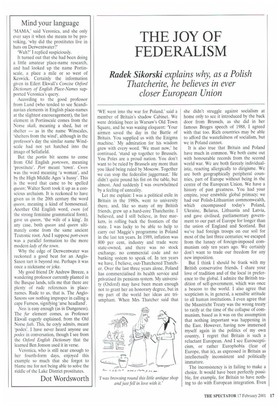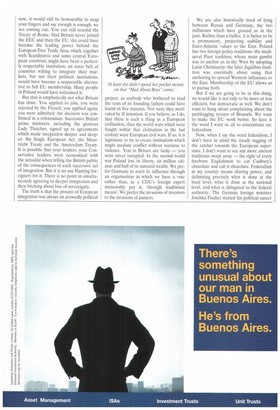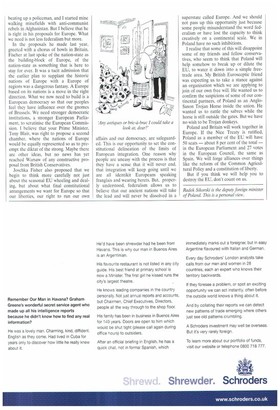THE JOY OF FEDERALISM
Radek Sikorski explains why, as a Polish
Thatcherite, he believes in ever closer European Union
'WE went into the war for Poland.' said a member of Britain's shadow Cabinet. We were drinking beer in Warsaw's Old Town Square, and he was waxing eloquent: 'Your airmen saved the day in the Battle of Britain. You supplied us with the Enigma machine.' My admiration for his wisdom grew with every word. 'We must now,' he continued, 'stand up together to Brussels. You Poles are a proud nation. You don't want to he ruled by Brussels any more than you liked being ruled by Moscow. Together we can stop the federalist juggernaut.' He didn't quite pound his fist on the table, but almost. And suddenly I was overwhelmed by a feeling of unreality.
Let me explain: I was a political exile in Britain in the 1980s, went to university there, and, like so many of my British friends, grew up a hard-core Thatcherite. I believed, and I still believe, in free markets, in rolling back the frontiers of the state. I was lucky to be able to help to carry out Maggie's programme in Poland in the last ten years. In 1989, inflation was 800 per cent, industry and trade were state-owned, and there was no stock exchange, no commercial code and no banking system to speak of. In ten years we have, I believe, out-Thatchered Thatcher. Over the last three years alone, Poland has commercialised its health service and privatised its pensions system. My university (Oxford) may have been mean enough not to grant her an honorary degree, but in my part of the world her ideas are triumphant. When Mrs Thatcher said that she didn't struggle against socialism at home only to see it introduced by the back door from Brussels, as she did in her famous Bruges speech of 1988, I agreed with that too. Rich countries may be able to afford the wastefulness of socialism, but we in Poland cannot.
It is also true that Britain and Poland have much in common. We both came out with honourable records from the second world war. We are both fiercely individualistic, reacting allergically to dirigisme. We are both geographically peripheral countries, part of Europe without being in the centre of the European Union. We have a history of past greatness. You had your empire, your erstwhile global primacy; we had our Polish-Lithuanian commonwealth, which encompassed today's Poland, Ukraine, Belarus, Lithuania and Latvia, and gave civilised, parliamentary government to our part of Europe for longer than the union of England and Scotland. But we've had foreign troops on our soil for most of the last three centuries; we escaped from the lunacy of foreign-imposed communism only ten years ago. We certainly don't want to trade our freedom for any new imposition.
But I think I should be frank with my British conservative friends. I share your love of tradition and of the local in preference to the global. I admire the British tradition of self-government, which was once a beacon to the world. I also agree that scepticism is, in general, a sensible attitude to all human institutions. I even agree that the Maastricht Treaty was the wrong treaty' to ratify at the time of the collapse of communism, based as it was on the assumption that nothing important was happening in the East. However, having now immersed myself again in the politics of my own country, I regret that Britain is such a reluctant European. And I see Euroscepticism, or rather Europhobia (fear of Europe, that is), as expressed in Britain as intellectually inconsistent and politically immature.
The inconsistency is in failing to make a choice. It would have been perfectly possible, for example, for Britain to have nothing to do with European integration. Even now, it would still be honourable to snap your fingers and say enough is enough, we are coming out. You can still rescind the Treaty of Rome. Had Britain never joined the EEC and then the EU, she could have become the leading power behind the European Free Trade Area, which, together with Scandinavia and some central European countries, might have been a perfectly respectable institution: an outer belt of countries willing to integrate their markets, but not their political institutions, would have become a respectable alternative to full EU membership. Many people in Poland would have welcomed it.
But that is emphatically not what Britain has done. You applied to join, you were rejected by the French; you applied again, you were admitted; the decision was confirmed in a referendum. Successive British prime ministers, including the glorious Lady Thatcher, signed up to agreements which made integration deeper and deeper: the Single European Act, the Maastricht Treaty and the Amsterdam Treaty. It is possible that your leaders, your Conservative leaders, were economical with the actuante when telling the British public of the consequences .of each successive act of integration. But it is no use blaming foreigners for it. There is no point in simultaneously agreeing to deeper integration and then bitching about loss of sovereignty.
The truth is that the process of European integration was always an avowedly political project, as anybody who bothered to read the texts of its founding fathers could have learnt in five minutes. Nor were they motivated by ill intention. If you believe, as I do, that there is such a thing as a European civilisation, then the world wars which were fought within that civilisation in the last century were European civil wars. If so, it is legitimate to try to create institutions which might mediate conflict without recourse to violence. You in Britain are lucky — you were never occupied. In the second world war Poland lost its liberty, six million citizens and half of its national wealth. We prefer Germany to exert its influence through an organisation in which we have a vote rather than, as a CDU's foreign expert memorably put it, 'through traditional means'. We prefer the invasions of investors to the invasions of panzers. We are also historically tired of lying between Russia and Germany, the two millstones which have ground us in the past. Rather than a buffer, it is better to be a promontory, projecting stability and Euro-Atlantic values to the East. Poland has two foreign-policy traditions: the mediaeval Piast tradition, whose main gambit was to anchor us in the West by adopting Latin Christianity; the later Jagiellon tradition was essentially about using that anchoring to spread Western influences to the East. Membership of the EU allows us to pursue both.
But if we are going to be in this thing, we would like it not only to be more or less efficient, but democratic as well. We don't want to hang about complaining about the pettifogging tyrants of Brussels. We want to make the EU work better. So here is the word I want us all to concentrate on: federalism.
Now, when I say the word federalism, I don't have in mind the steady tugging of the ratchet towards the European superstate. I don't want to see any more ancient traditions swept away — the right of every freeborn Englishman to eat Cadbury's chocolate and call it chocolate. Federalism in my country means sharing power, and delimiting precisely what is done at the local level, what is done at the national level, and what is delegated to the federal authority. The German foreign minister Joschka Fischer started his political career beating up a policeman, and I started mine walking minefields with anti-communist rebels in Afghanistan. But I believe that he is right in his proposals for Europe. What we need is not less federalism but more.
In the proposals he made last year, greeted with a chorus of howls in Britain, Fischer at last spoke of the nation-state as the building-block of Europe, of the nation-state as something that is here to stay for ever. It was a tacit admission that the earlier plan to supplant the historic nations of Europe with a Europe of regions was a dangerous fantasy. A Europe based on its nations is a move in the right direction. What we now need to build is a European democracy so that our peoples feel they have influence over the gnomes of Brussels. We need stronger democratic institutions, a stronger European Parliament, to scrutinise the European Commission. I believe that your Prime Minister, Tony Blair, was right to propose a second chamber, where the nations of Europe would be equally represented so as to preempt the diktat of the strong. Maybe there are other ideas, but no news has yet reached Warsaw of any constructive proposal from British Conservatives.
Joschka Fisher also proposed that we begin to think more carefully not just about the seasonal EU wheeling and dealing, but about what final constitutional arrangements we want for Europe so that our liberties, our right to run our own affairs and our democracy, are safeguarded. This is our opportunity to set the constitutional delineation of the limits of European integration. One reason why people are uneasy with the process is that they have a sense that it will never end, that integration will keep going until we are all identikit Europeans speaking franglais and wearing berets. But, properly understood, federalism allows us to believe that our ancient nations will take the lead and will never be dissolved in a superstate called Europe. And we should not pass up this opportunity just because some people misunderstand the word federalism or have lost the capacity to think creatively on a continental scale. We in Poland have no such inhibitions.
I realise that some of this will disappoint some of my friends and fellow conservatives, who seem to think that Poland will help somehow to break up or dilute the EU, to water it down into a simple freetrade area. My British Eurosceptic friend was expecting us to take a stance against an organisation which we are applying to join of our own free will. He wanted us to confirm the suspicions of some of our continental partners, of Poland as an AngloSaxon Trojan Horse inside the union. He wanted us to rattle the sabres while the horse is still outside the gates. But we have no wish to be Trojan donkeys.
Poland and Britain will work together in Europe. If the Nice Treaty is ratified, Poland as a member of the EU will have 50 seats — about 8 per cent of the total — in the European Parliament and 27 votes in the European Council, the same as Spain. We will forge alliances over things like the reform of the Common Agricultural Policy and a constitution of liberty.
But if you think we will help you to destroy the EU, don't count on us.
Radek Silcorski is the deputy foreign minister of Poland. This is a personal view.




































































 Previous page
Previous page